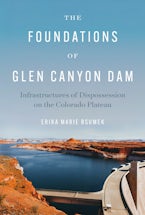[Bsumek] provides a fair, nuanced, and personal backstory of the megastructure.
(Alcalde) This is a useful corrective to the conventional view of infrastructure as massive public works projects . . . Most important, the humanity of her subjects shines through, and her territorial land acknowledgment for Glen Canyon Dam and Lake Powell is just and relevant.
(H-Net Environment) This is an important book. For historians of the West, it provides not just a model, but a challenge: to identify and explain colonialism and dispossession throughout the region’s past, even in places and times that might seem removed from such processes. This process may be uncomfortable, and it will probably be difficult; but Bsumek’s careful analysis of sources, actors, and perspectives has shown that it can-and should-be done.
(Pacific Historical Review) For newcomers to the history of the famous Glen Canyon Dam controversy, Erika Bsumek’s book is a good starting point; for others who already know a lot on this subject, the book is essential additional reading . . . It indelibly adds to existing writing, however, and should inform and affect all writings about western water yet to come.
(Water Alternatives Book Review) A masterful, powerful story...A necessary portrayal of human lives past, present, and future…Essential.
(CHOICE) The Foundations of Glen Canyon Dam thus offers an urgent update to existent scholarship by stressing how the dispossession of Native peoples-and their responses to it-dictated the dam’s future.
(Journal of Arizona History) The Foundations of Glen Canyon [Dam] is a thoughtful, well-argued, and useful book. It is an essential read for anyone interested in how settler colonialism in the American West is intertwined with religious ideologies, scientific knowledge, and state-sponsored expertise. It should find a welcome home in a range of upper division history courses and graduate seminars. The book also suggests some possibilities for future histories that might re-examine the engineered landscape through histories of dispossession.
(Mormon Studies Review) A bridge between canonical texts on western water history and recently written studies of Native American dispossession...[the book stresses] the importance of understanding the history of Native American dispossession, in part as a means of clarifying the choices for the future of the West.
(Agricultural History) The lived texture that Bsumek uncovers within these archives [of the Colorado Plateau's political, economic, and cultural matrix] helps readers understand cultural and spiritual practices as a coherent, shared social infrastructure.
(H-Net SciMedTech)

